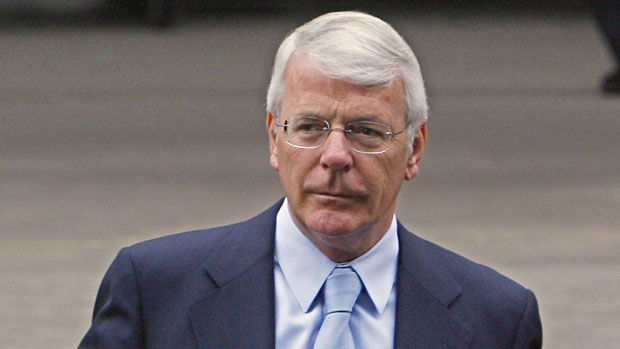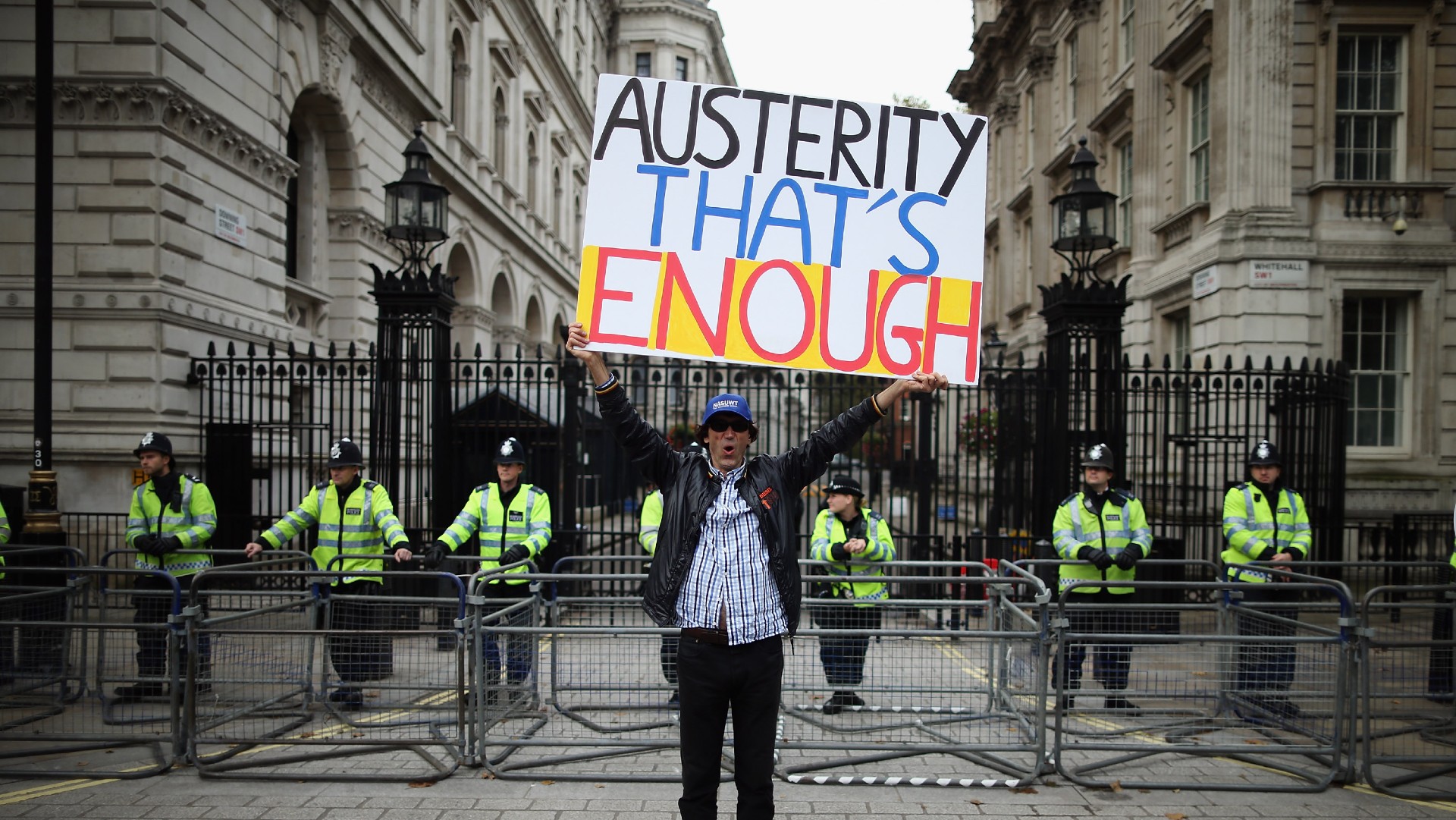John Major praises 'guts and drive' of immigrants in the UK
Former PM's tone on immigration contrasts with that of Cameron, who has launched crackdown on 'benefit tourism'

A free daily email with the biggest news stories of the day – and the best features from TheWeek.com
You are now subscribed
Your newsletter sign-up was successful
Former Prime Minister Sir John Major has praised immigrants for having the "guts" and "drive" to travel across the world to better themselves.
In an interview for BBC Radio 4's Reflections, to be broadcast tomorrow, he rejects the idea that immigrants always come to Britain to benefit from the country's welfare system. Instead, he describes immigrants as having "the very Conservative instinct" of wanting to improve their lives and that of their families.
Talking about growing up in Brixton in the 1950s, he says he saw immigration at "very close quarters" when there was a "different social value" placed on immigration.
The Week
Escape your echo chamber. Get the facts behind the news, plus analysis from multiple perspectives.

Sign up for The Week's Free Newsletters
From our morning news briefing to a weekly Good News Newsletter, get the best of The Week delivered directly to your inbox.
From our morning news briefing to a weekly Good News Newsletter, get the best of The Week delivered directly to your inbox.
"They shared my house," he says. "They were my neighbours. I played with them as boys. I didn't see people who had come here just to benefit from our social system. I saw people with guts and the drive to travel halfway across the world in many cases to better themselves and their families."
His tone contrasts to that used by Prime Minister David Cameron who announced last month that he would cut the available benefits for Europeans arriving in the UK, notes the BBC.
Cameron blamed Labour for creating an "increasingly generous, no-questions-asked welfare system which drew migrants to Britain for the wrong reasons" and said his party's goal was to create an "immigration system that puts Britain first".
In the New Statesman, George Eaton described Cameron's crackdown as an attempt to respond to public anxiety over immigration and to neutralise the threat from Ukip. Eaton argued that Cameron fuelled perceptions that "benefit tourism" is a problem, but responded with measures that many will regard as inadequate, allowing himself to be outflanked by Ukip.
A free daily email with the biggest news stories of the day – and the best features from TheWeek.com
"Rather than perpetuating public fear over immigration, to the benefit of Ukip alone, the PM would be better off telling voters the truth," wrote Eaton, "that migrants are less likely than British citizens to claim benefits and that they contribute more in taxes than they extract in welfare."
Immigration levels fuelled by Brits refusing to work, says IDS
11 Aug
British people who chose to live on benefits instead of getting a job have fuelled levels of immigration, according to the Work and Pensions Secretary.
Iain Duncan Smith has switched the claim that foreign workers are stealing jobs from British people, and instead blamed Labour's "dysfunctional" welfare system for an increase in demand for overseas workers.
"Immigration into the UK has been a supply and demand issue," he told an audience in London today. "Businesses needed the labour and, because of the way our benefit system was constructed, too few of the economically inactive took the jobs on offer."
Duncan Smith blamed the last Labour government for leaving whole sections of society on the sidelines without employment. The number of households where nobody has ever worked doubled, he said, while more than half of the rise in employment was accounted for by foreign nationals.
When the coalition came into power in 2010, almost five million people were on out-of-work benefits, said Duncan Smith. "It was clear to me that in large part this situation was the product of a dysfunctional welfare system that often trapped those it was supposed to help in cycles of worklessness and dependency."
His comments come as the Daily Mail accuses the government of failing to follow through on its string of pledges to deport more foreign criminals.
A Freedom of Information request found that the number of foreign criminals avoiding deportation doubled last year. Out of 4,030 overseas convicts considered for deportation in 2012/13, 1,310 were not sent home – nearly a third.
They included 15 murderers, five people guilty of manslaughter, 15 rapists, 140 robbers and 20 guilty of sex offences against children, says the Mail. In the previous year, 890 avoided removal, out of 3,380 cases – just over a quarter.
Last month, David Cameron announced a new policy of "deport first, appeal later" for foreign criminals in the UK, except when there is a risk of serious harm in their home country.
Immigration: what is the impact on the UK economy?
01 Aug
Britain faces water shortages, failing hospitals and overcrowded schools if immigration goes unchecked, a new report has warned. Independent think-tank Civitas claims the economic benefits of large-scale immigration in the future risks being outweighed by a negative impact on living standards. In its analysis of the economic and demographic consequences of current levels of immigration, it argues that any gains would be small compared with the strains placed on amenities.
How fast is the population growing?
The Office for National Statistics (ONS) says Britain's population has grown at a rate of 0.7 per cent a year over the last decade, with immigration accounting for at least 60 per cent of the growth. Robert Rowthorn, the Cambridge University economist who wrote the Civitas report, says it will be "virtually impossible" for the government to reduce net migration to its "tens of thousands" target if EU migration continues at its present rate. According to the ONS, the UK's population could grow by 20 million over the next 50 years and 29 million over the next 75 years in a "high migration scenario" – although the figure could of course be much lower in reality.
Isn't immigration good for the economy?
In June last year, the Organisation for Economic Co-operation & Development (OECD) published a report showing that immigration makes a positive contribution to the public finances of many countries, including the UK. The Migration Observatory has also noted that in the short term immigration might help the "dependency ratio", the number of people of working age compared to those not of working age. However, it says this effect is likely to diminish in the long-term as migrants who stay in the UK become older and retire. The Civitas report describes the benefits of migration to the dependency ratio as "front-loaded" and claims that "rejuvenating the UK's ageing population through immigration will be an endless treadmill requiring never-ending stream of newcomers".
What might be the impact on the economy?
If immigration is not restricted, Civitas predicts that gross domestic product (GDP) will grow as a whole but GDP per capita will be only marginally affected as it is spread across a larger population. The result is likely to be a housing shortage and pressure on public services, such as schools, hospitals and transport infrastructure, it says. With the population likely to grow in the "water-stressed" south, water supplies might also have to be rationed.
"Unrestrained population growth would eventually have a negative impact on the standard of living through its environmental effects such as overcrowding, congestion and loss of amenity," says the report. "Such losses would ultimately outweigh the small gain in average wages apparently resulting from mass immigration."
What about 'benefit tourism'?
A report from the University College London, published in November 2013, found that UK immigrants who arrived since 2000 are less likely to receive benefits and less likely to live in social housing than UK natives. Between 2001 and 2011, UK immigrants from the European Economic Area contributed about 34 per cent more in taxes than they received in benefits, it said.
Is everyone affected equally?
Another study by the Migration Observatory said that "immigration has a small impact on average wages of existing workers but more significant effects along the wage distribution: low-wage workers lose while medium and high-paid workers gain". The most recent British Social Attitudes survey found that there has been a "polarisation" between different social groups in their concerns about immigration. "While all groups have become more concerned, the trend has been greater among the less qualified and among less-skilled workers," it said.
-
 Quiz of The Week: 14 – 20 February
Quiz of The Week: 14 – 20 FebruaryQuiz Have you been paying attention to The Week’s news?
-
 The Week Unwrapped: Do the Freemasons have too much sway in the police force?
The Week Unwrapped: Do the Freemasons have too much sway in the police force?Podcast Plus, what does the growing popularity of prediction markets mean for the future? And why are UK film and TV workers struggling?
-
 Properties of the week: pretty thatched cottages
Properties of the week: pretty thatched cottagesThe Week Recommends Featuring homes in West Sussex, Dorset and Suffolk
-
 Do Tory tax cuts herald return of austerity?
Do Tory tax cuts herald return of austerity?Today's Big Question Chancellor U-turns on scrapping top rate tax but urges ministers to make public spending cuts
-
 Labour shortages: the ‘most urgent problem’ facing the UK economy right now
Labour shortages: the ‘most urgent problem’ facing the UK economy right nowSpeed Read Britain is currently in the grip of an ‘employment crisis’
-
 Will the energy war hurt Europe more than Russia?
Will the energy war hurt Europe more than Russia?Speed Read European Commission proposes a total ban on Russian oil
-
 Will Elon Musk manage to take over Twitter?
Will Elon Musk manage to take over Twitter?Speed Read The world’s richest man has launched a hostile takeover bid worth $43bn
-
 Shoppers urged not to buy into dodgy Black Friday deals
Shoppers urged not to buy into dodgy Black Friday dealsSpeed Read Consumer watchdog says better prices can be had on most of the so-called bargain offers
-
 Ryanair: readying for departure from London
Ryanair: readying for departure from LondonSpeed Read Plans to delist Ryanair from the London Stock Exchange could spell ‘another blow’ to the ‘dwindling’ London market
-
 Out of fashion: Asos ‘curse’ has struck again
Out of fashion: Asos ‘curse’ has struck againSpeed Read Share price tumbles following the departure of CEO Nick Beighton
-
 Universal Music’s blockbuster listing: don’t stop me now…
Universal Music’s blockbuster listing: don’t stop me now…Speed Read Investors are betting heavily that the ‘boom in music streaming’, which has transformed Universal’s fortunes, ‘still has a long way to go’